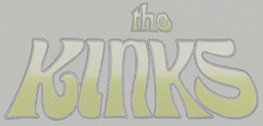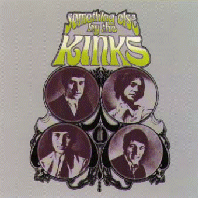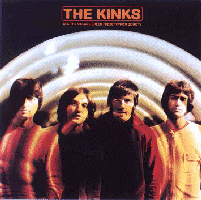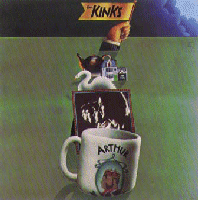THE GOLDEN AGE OF

(1966-1972)
by Jason Gross (December 1996)
"Really, I'm quite a traditionalist" -Ray Davies
What do Van Halen, the Raincoats, Mott the Hoople, the Pretenders, Elvis Costello, Big Star, the Fall, Herman's Hermits, the Jam, Kristy Macoll, David Bowie and Blur have in common? Not a whole hell of a lot except that they've all done songs penned by Raymond Douglas Davies of course. The Kinks songbook of the '60s is varied and strong enough to get such a wide range of groups as fans. The band rode in on the British invasion with loud, unruly rockers but soon turned into a quirky, nostalgic outfit that made their best work totally out-of-synch with the rest of the music world: only Donovan was as out-of-it musically but Davies had a better ear for melodies and more thoughtful lyrics.When the band started out with a string of hits including "You Really Got Me" and "All Day and All the Night," it looked like they were on top of the world and ready to stay there. Problems racked the band though including, for Ray, nervous breakdowns, blackouts, and drunken fits. As Ray put it, there was "jealousy, greed, resentment, misunderstanding" not to mention his storing money in footware. It was the pressure of touring, mistrust of managers and record companies and worst of all, an incident with the powerful American Federation of Musicians union. Whether Ray did or didn't slug someone isn't important- the result is that the band was banded from gigging in the USA for four years. For a band that was just peaking, this was a disaster. Also considering that most bands don't last for four years, it was amazing that the band survived. As it was, they had to watch a flood of other English bands invade the States and rake in the money.
Back home in England, their singles scored pretty well though their albums were (financial) flops. It was during this time, about 1966-1971, that was the band's prime time where they made great, very unfashionable music. Like the Beach Boys, the Beatles and Rolling Stones, the band starting making albums as complete statements rather than just a bunch of singles with filler. But while the rest of the USA/UK bands were indulging in psychedelic sounds, Davies in company were indulging in whimsy, music hall and nostalgia: you could almost imagine him in a straw hat and striped shirt with a cane, a smile and a wink prancing around a stage. It was too British for the American market and not "groovy" enough for Swinging London. The result was that the Kinks albums from this time (up to LOLA) were thought to have only chalked up a sales of a couple of thousand only after tearing up the charts a few years before that.
Not too surprising then, the group was in constant upheaval. Other than Ray chasing a manager around the streets, only to wind up in a looney bin. Bassist Peter Quaife quit and rejoined the band only to quit again in 1969. Drummer Mick Avory took time off for medical reasons and Ray's brother Dave auditioned replacements for Ray himself. The few gigs they did manage were sloppy and full of fist-fights among the group. What's worse, the band was getting little support from their record company and their producer Shel Talmy was getting pushed out by Ray so that he could take over the production chores. With his professional and personal life turning into shit, his lyrics started to reflect this burden, getting depressed at first and looking for escapes later and the music itself maybe also leaning to "good-old-days."
A cab driver once said to Davies "I like your songs, but why are you always trying to take the starch out of us?" Ray's response was "I haven't got it in for anybody. Because in all these people I can see the same weaknesses I've got."
 "Dedicated Follower of Fashion" and "Well Respected Man" showed that Davies always knew how to rap the middle-class over the knuckles. Although the band was starting to show some sophistication with THE KINKS CONTROVERSY (with "I'm On An Island" and a Sleepy John Estes cover), their prime stuff really began with FACE TO FACE. Mixing their rowdy rock with Indian scales, folk, music hall, they did it all tastefully with only Nicky Hopkins' harpsichord playing along with them. Ray's songs ran the gamut from the commercialization of culture, a plea to a lost love, working as a sideman and a sympathetic nod to a fop. Most of all, Ray was painted a depressing picture of losing your marbles, losing your house and losing your woman- some real working class blues. Thanks to a deceptively bouncy opener and closer (about not getting a call through and another farewell to a woman) and the fact that he or Talmy didn't go for horn or string clutter, this sounded plausible rather than mean-spirited (like he'd later be) or overwraught (ditto). If anything, this great album is a triumph because he rummages through all his pain but won't give in to it. Of course, it helped that they had one of their few US hits at this time with the wistful sing-a-long "Sunny Afternoon."
"Dedicated Follower of Fashion" and "Well Respected Man" showed that Davies always knew how to rap the middle-class over the knuckles. Although the band was starting to show some sophistication with THE KINKS CONTROVERSY (with "I'm On An Island" and a Sleepy John Estes cover), their prime stuff really began with FACE TO FACE. Mixing their rowdy rock with Indian scales, folk, music hall, they did it all tastefully with only Nicky Hopkins' harpsichord playing along with them. Ray's songs ran the gamut from the commercialization of culture, a plea to a lost love, working as a sideman and a sympathetic nod to a fop. Most of all, Ray was painted a depressing picture of losing your marbles, losing your house and losing your woman- some real working class blues. Thanks to a deceptively bouncy opener and closer (about not getting a call through and another farewell to a woman) and the fact that he or Talmy didn't go for horn or string clutter, this sounded plausible rather than mean-spirited (like he'd later be) or overwraught (ditto). If anything, this great album is a triumph because he rummages through all his pain but won't give in to it. Of course, it helped that they had one of their few US hits at this time with the wistful sing-a-long "Sunny Afternoon." After all of this artful doom and gloom, SOMETHING ELSE (their last album with Talmy) was a little more upbeat. "David Watts" was more class consciousness and a little green envy to a bouncy beat. Dave had his amusing Dylan-ish "Death of A Clown" and the hopeful "Love Me Till The Sun Shines" (both part of his planned solo album) along with the sweet "Funny Face". Ray weighed in with lythe "Two Sisters," "End of the Season" and "No Return" where he calmly sang of jealously, ennui and more lost love (who said adversity didn't make great art?). "Harry Rag" and "Tin Soldier Man" were old-timey flourishes about the evils of pot and light political commentary: he'd turn to more nostalgia and anti-war propaganda in the next albums. His great side-closers stole the show though. "Situation Vacant" was a snappier version "Sunny Afternoon"'s down-and-out rummaging. "Waterloo Sunset" is probably the most respected and beautiful songs- the "dirty old river" with the lovers by the station. If that ain't modern love, nothing is. It's probably their best-liked album and there's a lot of good reason why.
After all of this artful doom and gloom, SOMETHING ELSE (their last album with Talmy) was a little more upbeat. "David Watts" was more class consciousness and a little green envy to a bouncy beat. Dave had his amusing Dylan-ish "Death of A Clown" and the hopeful "Love Me Till The Sun Shines" (both part of his planned solo album) along with the sweet "Funny Face". Ray weighed in with lythe "Two Sisters," "End of the Season" and "No Return" where he calmly sang of jealously, ennui and more lost love (who said adversity didn't make great art?). "Harry Rag" and "Tin Soldier Man" were old-timey flourishes about the evils of pot and light political commentary: he'd turn to more nostalgia and anti-war propaganda in the next albums. His great side-closers stole the show though. "Situation Vacant" was a snappier version "Sunny Afternoon"'s down-and-out rummaging. "Waterloo Sunset" is probably the most respected and beautiful songs- the "dirty old river" with the lovers by the station. If that ain't modern love, nothing is. It's probably their best-liked album and there's a lot of good reason why. The runner-up or other best-loved Kinks album has to be VILLAGE GREEN, even if it meant their commercial low-point (which ought to tell you something). Ray took the controls for the first time and this meant not only no Shel Talmy but no songs from Dave either (either ego or saved up for his solo LP, I guess). Ray wasn't depressed anymore it seemed and he wasn't a working-class hero either- he seemed to find a country respite. Daydreams were the order of the day with the title track(s), a great lyrical ode to an old buddy ("people may change but memories of people still remain"), going through photos, old trains, the riverside and a farm. Other than the eye-popping cover and centerfold, Ray's only flirting with psychedelic music was a run-in with the cat from ALICE IN WONDERLAND and a "wicked witch" but these were more little kid's games than freaked-out turn-on's. Ray was wistful and longing (except for the anti-religion "Big Sky" where Ray promises "one day, we'll be free"), like never before or after. Lovely, sweet and catchy and a long way from "You Really Got Me," it was only really "pop" music by association except for his "Smokestack Lightning" cop and his witch song. Otherwise, you had Ray doing waltzes, crooning and indulging in ye olde English pomp along with liberal use of a mellotron. His first real concept album is impressive but serves as an uneasy bridge between his whole slew of rock operas and soundtracks that he would churn out for years.
The runner-up or other best-loved Kinks album has to be VILLAGE GREEN, even if it meant their commercial low-point (which ought to tell you something). Ray took the controls for the first time and this meant not only no Shel Talmy but no songs from Dave either (either ego or saved up for his solo LP, I guess). Ray wasn't depressed anymore it seemed and he wasn't a working-class hero either- he seemed to find a country respite. Daydreams were the order of the day with the title track(s), a great lyrical ode to an old buddy ("people may change but memories of people still remain"), going through photos, old trains, the riverside and a farm. Other than the eye-popping cover and centerfold, Ray's only flirting with psychedelic music was a run-in with the cat from ALICE IN WONDERLAND and a "wicked witch" but these were more little kid's games than freaked-out turn-on's. Ray was wistful and longing (except for the anti-religion "Big Sky" where Ray promises "one day, we'll be free"), like never before or after. Lovely, sweet and catchy and a long way from "You Really Got Me," it was only really "pop" music by association except for his "Smokestack Lightning" cop and his witch song. Otherwise, you had Ray doing waltzes, crooning and indulging in ye olde English pomp along with liberal use of a mellotron. His first real concept album is impressive but serves as an uneasy bridge between his whole slew of rock operas and soundtracks that he would churn out for years. The first of these happened to be one of his best though. As far as an anti-war rock operas go, ARTHUR beats the hell out of Pink Floyd's THE FINAL CUT (or Metallica's anthems) even if Granada TV decided to yank it from the schedule at the last minute. Davies was still astute in being able to get into the longing for simpler times, that were later turned upside down. The fighting men ain't no Rambos but a bunch of robots, waiting for orders to breath as their mothers wonder why their boys bled to death in some foxhole. The subtitle THE DECLINE AND FALL OF THE BRITISH EMPIRE might seem pretty grand but it summed up the personal view of a nation that thought it still ruled the world but saw it slip away. They would get morose about their future, linking the might and right of their country with their own well-being. These people would go on to take orders from bosses and managers instead of generals and majors. Kind of reminds you of the USA too.
The first of these happened to be one of his best though. As far as an anti-war rock operas go, ARTHUR beats the hell out of Pink Floyd's THE FINAL CUT (or Metallica's anthems) even if Granada TV decided to yank it from the schedule at the last minute. Davies was still astute in being able to get into the longing for simpler times, that were later turned upside down. The fighting men ain't no Rambos but a bunch of robots, waiting for orders to breath as their mothers wonder why their boys bled to death in some foxhole. The subtitle THE DECLINE AND FALL OF THE BRITISH EMPIRE might seem pretty grand but it summed up the personal view of a nation that thought it still ruled the world but saw it slip away. They would get morose about their future, linking the might and right of their country with their own well-being. These people would go on to take orders from bosses and managers instead of generals and majors. Kind of reminds you of the USA too.Musically, ARTHUR was kind of a schizo album, filled with little VILLAGE GREEN reveries ("Driving," "Young and Innocent Days" and "She's Bought A Hat Like Princess Marina" with its vaudeville camp), horn and string clutter, loud rockers (the great "Victoria"- the rockingest song about nostalgia, which stomps all over VILLAGE GREEN) and artsy pomp that would become Davies' stock-in-trade in most of the '70s. Best were the infectious rockers/singalongs that had quiet, delicate sections to them like "Australia" (where they actually jam like the Grateful Dead) and "Shangri-La." "Mr. Churchill Says" starts out scrappy but then (appropriately) turns into an excited stomp once a siren sounds. "Arthur" and "Nothing To Say" were likable, singalong rockers but not much more. Sad to say that this marked the start of their downturn- you got to see a preview of the mucky rock operas that Davies had in store. This was also the last fairly strong album they managed (except maybe for MUSWELL HILLBILLIES).
As before, Davies turned out to be a strong singles artist. LOLA and PERCY were pretty damn depressing and not just lyrically. Both were concept records (with PERCY a soundtrack to a barely existing film). LOLA was Ray's chance to dump his bile all over the music industry. This was the bitter, scathing Ray that would take over most of the rest of his career. The great exception is "Lola" itself- sexual confusion in lots of ways to a yell-along chorus.
The slew of singles that the band released were mostly hits (in England) but never really matched the best material that they crafted for their albums. Songs like "Autumn Almanac," "Mr. Pleasant" and "Wonderboy" were a little light-weight compared to more substantial work on VILLAGE GREEN, SOMETHING ELSE and especially FACE TO FACE. "I'm Not Like Everybody Else" however was an anthem for any outcast, courtesy of Dave. "Days" is probably even more luscious than "Waterloo Sunset" with Ray swooning in the memories of his love. No wonder Kristy Maccoll and Elvis Costello covered it.
Sad to say that other than the great collections like KINK KRONKILES and GREAT LOST KINKS ALBUM (collecting Ray's TV themes and more of Dave's solo material) that came out in the next few years, Ray had most of his great work behind him. To say that he was totally devoid of good rockers or lyrical tunes is a lie: a rocking number called "The Hard Way," the modern day confusion of "20th Century Man" and the lovely "Celluloid Heros" are proof enough.
It was only when the 70's began that Ray's concepts got the best of him. He'd done soundtracks and concepts but got REALLY carried away by then. Some good singles were there but music suffered a lot as he got a worse case of self-righteous art wanking than Townsend (it took Clive Davis to snap him out of it with a lucrative contract). I still wonder if it was just a coincidence that the band's commercial donwturn began with AFM ban and ended when it was lifted four years later. Of course, going from a clueless record company that doesn't give a shit about you (Pye) to a label that's ready to back you with money and break you in the States again (Reprise) probably had something to do with it too.
In any case, Ray went on to make things worse with crass music, fine-tuned for the radio and a tour of South Africa while Mandela rotted in a jail cell. Nevertheless, all the years of disgrace can't take away from a few years where he bucked the system that had bucked him and made lyrical, beautiful music that's not heard at all nowadays.
SINGLES
Sunny Afternoon/I'm Not Like Everybody Else (1966)
Dead End Street/Big Black Smoke (1967)
Mr. Pleasant/Harry Rag (1967)
Waterloo Sunset/Two Sisters (1967)
Death of A Clown/Love Me 'Til The Sun Shines (1967)
Autumn Almanac/David Watts (1967)
Susannah's Still Alive/Funny Face (1968)
Wonderboy/Polly (1968)
Days/She's Got Everything (1968)
Starstruck/Picture Book (1969)
Village Green Preservation Society/Do You Remember Walter? (1969)
Victoria/Brainwashed (1969)
Lola/Mindless Child of Motherhood (1970)
Apeman/Rats (1970)
God's Children/The Way Love Used To Be (1971)
King Kong/Waterloo Sunset (1972)
ALBUMS:
FACE TO FACE (1967)
SOMETHING ELSE BY THE KINKS (1968)
THE KINKS ARE THE VILLAGE GREEN PRESERVATION SOCIETY (1969)
ARTHUR OR THE DECLINE AND FALL OF THE BRITISH EMPIRE (1969)
LOLA VS. POWERMAN AND THE MONEY-GO-ROUND (1970)
PERCY (1971)
(Live At the Kelvin Hall came out in '68 but it's not discussed here because it was a rehash of old hits)
COMPILATIONS:
KINKS KRONKILES (1972) (most of the singles, album highlights and B-sides)
THE GREAT LOST KINKS ALBUM (1973) (mostly B-sides and out-takes: the real "Great Lost" album was FOUR MORE RESPECTED GENTLEMEN which turned into VILLAGE GREEN)
NOTE: a lot of the source material came from WELL RESPECTED MEN by Neville Martin and Jeffrey Hudson (Castle): to buy a copy at the special price of £7.99 (RRP £9.99) including P&P in the UK, please contact Bookpost on 01624 836000 or bookshop@enterprise.net, quoting reference Kinks. Also, a lot of prime material was culled from a great article in GOLDMINE (March 19, 1993) by William Ruhlmann.
Special thanks to Scott Davis who got me thinking about the Kinks again (not to mention singing their old songs with him) after being a lapsed fan.